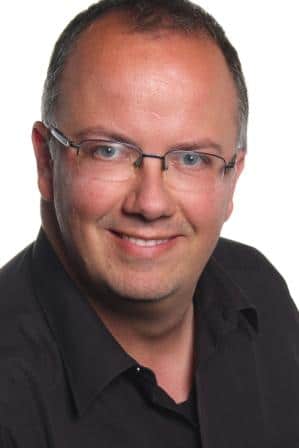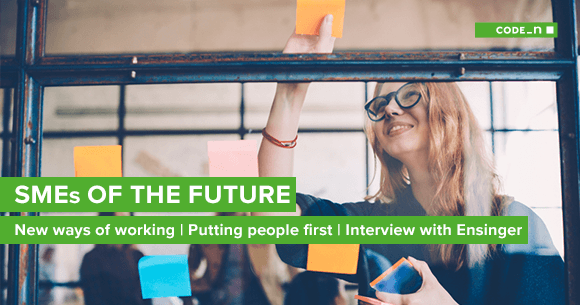FELIKS EYSER: “I SEE MANY FOUNDERS WHO ARE BOGGED DOWN IN DETAILS OR PRIORITIZE THE WRONG TASKS AND STRATEGIES. THAT’S WHERE AN EXPERIENCED OUTSIDE PERSPECTIVE CAN HELP.”FELIKS EYSER „ICH SEHE VIELE GRÜNDER, DIE SICH IN DETAILS VERRENNEN ODER IHRE AUFGABEN UND STRATEGIEN FALSCH PRIORISIEREN. HIER HILFT EIN ERFAHRENER BLICK VON AUSSEN.“
As the successful founder of Justaloud and RegioHelden, Feliks Eyser knows what is especially important for startups. In an interview with Oliver Gassner, he explains what really matters to him as the Managing Director of RegioHelden, outlines his experiences with startup contests, and reveals how his company is most successful at trade shows.
 Oliver Gassner: Hi Feliks, would you please introduce yourself to our readers?
Oliver Gassner: Hi Feliks, would you please introduce yourself to our readers?
Feliks Eyser: Feliks Eyser, business IT specialist, founder and Managing Director of RegioHelden GmbH.
OG: What exactly does RegioHelden do?
FE:RegioHelden is a specialist service provider for local Internet advertising. In other words, we help lawyers, dentists and craftsmen gain new customers via the Internet.
OG: And you do that primarily with Adwords? Or what else do you use?
FE: That’s right, Adwords is the most important channel. We also offer Google Places management.
OG: If I understand correctly, things are going really well for you at the moment. How many employees are you adding per month, and at how many locations?
FE: We currently operate four locations with a staff of around 45. We’ll be adding about another 15 by March. New locations are slated for the summer.
OG: How do you manage that kind of growth? Huge enterprises like SAP are geared for it, but you?
FE: Learning by doing. 😉 The most important aspect from the organizational perspective is a strong middle management consisting of people that each supervise teams of three to ten.
OG: And how is the quality of the applicants? Are you satisfied with them, or do they need a huge amount of training? Startups with a strong development orientation have real bottlenecks to contend with.
FE: Well, the nice thing about us is that we’re not that strongly development-driven. We’re more about sales. The quantity of applications is no problem (several hundred per month). The bottleneck is in fact one of quality. As a rule, we seek out applicants who have the right spirit and who we can train for the specifics. Basically, we hire for attitude and train for skill.
OG: Sounds like a good tactic.
CODE_n is a contest for founders in the mobile sector. How important are contests and prizes for business founders?
FE: If the prize money is high enough, it’s an interesting way to finance your activities while in bootstrapping mode. That’s what we did at my previous project, Justaloud. The publicity and the contacts that are always touted as an incentive didn’t really help us that much back then, however. At RegioHelden, we don’t participate in contests for lack of time.
OG: If you were on the jury of a startup contest, what would you look for in a company to put it at the top of your list?
FE: A strong team, a sustainable revenue model, and a clear marketing and sales strategy.
OG: Among business founders, there are the serial founder types and the execution types. Serial founders often go into VC or become active as a business angel. Execution types tend to become CEOs of something big. What will you be in five years? On your fourth startup, a business angel, CEO of XING, or on an extended vacation?
FE: To be honest, I’m not giving that much thought at the moment. But I don’t really see myself as the CEO of a big company that I didn’t found. 🙂
OG: Well put. 😉 What do startups really need – assuming they have developers and an alpha: connections, good advice, money?
FE: Good advice certainly helped me the most. I can only recommend that founders actively seek contact to experienced mentors and constantly get input about their own business model and development. I see many founders who are bogged down in details or prioritize the wrong tasks and strategies. That’s where an experienced outside perspective can help keep things on track.
OG: The prize for the CODE_n contest is the opportunity to exhibit at CeBIT together with other winners in a special CODE_n exhibition space. What’s your killer tip for startups on how to make the most of such an opportunity?
FE: Be aggressive. 😉 When we started exhibiting at trade shows, we were very passive and took few leads home with us. These days, we really lay it on: magicians at the booth, contests, all kinds of goodies, lots of staff (up to six people at a stand of four square meters) and the mindset that we’re going to approach everyone. Using those tactics at your average SMB trade fair, we convert up to ten percent of visitors into leads who give us their contact information. When we started, that figure was less than one percent.
OG: What are you doing at CeBIT? Is that even your target audience? I can’t really imagine finding dentists or craftsmen there.
FE: Right, and that’s why we’re not exhibiting there. The trade fairs we take part in are relatively small and not very well-known, but focus tightly on our SMB target group.
OG: If you could name a startup (in Germany, Austria or Switzerland, but not Stuttgart 😉 ) that we should interview, who would it be and why?
FE: Have a word with the guys at sofatutor in Berlin: they’re a really nice team with a cool, useful product.
OG: Thanks for the interview and your time.Als erfolgreicher Gründer von Justaloud und den RegioHelden weiß Feliks Eyser worauf Startups besonders achten sollten. Im Interview mit Oliver Gassner erzählt er, auf was er als Geschäftsführer der RegioHelden Wert legt, welche Erfahrungen er selbst mit Gründerwettbewerben gemacht hat und womit sein Unternehmen am meisten Erfolg auf Messen hat.
 Oliver Gassner: Hallo Feliks, würdest du dich unseren Lesern bitte kurz vorstellen?
Oliver Gassner: Hallo Feliks, würdest du dich unseren Lesern bitte kurz vorstellen?
Feliks Eyser: Feliks Eyser, Wirtschaftsinformatiker, Gründer und GF der RegioHelden GmbH.
OG: Und was genau machen die RegioHelden?
FE:RegioHelden ist ein spezialisierter Dienstleiter für lokale Internetwerbung. Das heißt wir helfen Rechtsanwälten, Zahnärzten und Handwerkern dabei über das Internet neue Kunden zu gewinnen.
OG: Und das primär mit AdWords? Oder was benutzt ihr noch?
FE: Genau, AdWords ist der wichtigste Kanal. Daneben bieten wir noch Google Places Management an.
OG: Wenn ich recht verstehe, geht es bei euch momentan rund: Ihr wachst gerade mit wie vielen Mitarbeitern pro Monat an wie vielen Standorten?
FE: Zurzeit betreiben wir 4 Standorte mit ca. 45 Mitarbeitern. Bis März werden nochmal ca. 15 dazukommen. Neue Standorte sind erst für Sommer angedacht.
OG: Wie managt man ein solches Wachstum? Riesenfirmen wie SAP sind ja darauf eingerichtet. Aber ihr?
FE: Learning by doing 😉 Das Wichtigste ist mittlerweile organisatorisch ein starkes Middle Management von Leuten, die jeweils Teams von 3-10 Personen unter sich haben.
OG: Und wie sieht es mit der Qualität der Bewerber aus? Seid ihr da zufrieden oder müssen die massiv geschult werden? Eher Development-orientierte Startups haben da ja echte Engpässe.
FE: Gut, das Schöne bei uns ist, dass wir nicht so stark Development-getrieben sind. Bei uns geht es eher um Sales. Die Quantität der Bewerbungen ist kein Problem (mehrere Hundert pro Monat). Der Engpass ist tatsächlich eher die Qualität. Grundsätzlich suchen wir uns Kandidaten aus, die den richtigen Spirit mitbringen und denen wir die fachlichen Themen antrainieren können. Quasi nach dem Motto “hire for attitude, train for skill”.
OG: Klingt wie eine gute Taktik.
CODE_n ist ein Wettbewerb für Gründer im Bereich ‘mobile’; wie wichtig sind Wettbewerbe und Preise für Gründer?
FE: Wenn die Preisgelder hoch sind ist das eine interessante Maßnahme, um sich im Bootstrapping Modus zu finanzieren. Das haben wir bei meinem vorherigen Projekt, Justaloud, gemacht. Die Publicity und die Kontakte, die als Anreiz immer angepriesen werden, haben uns damals allerdings nicht stark weitergebracht. Bei RegioHelden machen wir aus Zeitmangel nicht mehr bei solchen Wettbewerben mit.
OG: Wenn Du in einer Jury für einen Gründerwettbewerb wärst: Wonach würdest Du bei einem Startup suchen, um es ganz oben auf die Votingliste zu setzen?
FE: Nach einem starken Team, einem nachhaltigen Erlösmodell und einer klaren Marketing-/Vertriebsstrategie.
OG: Es gibt ja eher die Seriengründer-Typen und die Execution-Typen. Serien-Gründer wandern dann oft ins VC oder Angel-Lager ab. Die Execution-Typen werden CEO von was Großem. Was machst du in 5 Jahren? Das 4. Startup oder Angel oder CEO von XING oder Dauerurlaub?
FE: Ich muss ehrlich sagen – darüber mache ich mir heute noch nicht viele Gedanken. Aber als CEO von einem großen Unternehmen, das ich nicht gegründet habe sehe ich mich nicht 🙂
OG: Das hast du schön gesagt 😉
Was brauchen Startups wirklich – wenn wir mal annehmen, dass sie Developer und einen Alpha haben: Connections, guten Rat, Geld?
FE: Was mich am stärksten weitergebracht hat war tatsächlich der gute Rat. Ich kann jedem Gründer nur empfehlen, aktiv den Kontakt zu erfahrenen Mentoren zu suchen und sich permanent Input zum eigenen Geschäftsmodell und der Entwicklung einzuholen. Ich sehe viele Gründer, die sich in Details verrennen oder ihre Aufgaben/Strategien falsch priorisieren. Hier hilft ein erfahrener Blick von außen, um die Entwicklung in der Spur zu halten.
OG: Der Preis für den Sieg bei CODE_n ist ein Ausstellungsplatz, zusammen mit anderen Gewinnern auf der CeBIT, auf einer speziellen CODE_n_Fläche. Was ist Dein Killer-Tipp für ein Startup, wie sie diese Gelegenheit optimal nutzen können?
FE: Aggressives Auftreten 😉 Bei unseren Messeauftritten waren wir am Anfang sehr passiv und haben wenige Leads mit nach Hause genommen. Mittlerweile fahren wir das volle Programm auf: Zauberer am Stand, Gewinnspiele, alle möglichen Arten von Goodies, viel Personal (teilweise 6 Personen bei einem 4 qm Stand) und die Mentalität auf jeden zuzugehen. Auf einer durchschnittlichen Mittelstandsmesse konvertieren wir mit der Taktik bis zu 10% der Besucher zu Leads, die uns ihre Kontaktdaten hinterlassen. Als wir angefangen haben lagen wir bei <1%.
OG: Was macht ihr bei der CeBIT? Ist da überhaupt eure Zielgruppe? Ich kann mir da jetzt schwer Handwerker und Zahnärzte vorstellen.
FE: Richtig, deswegen sind wir dort auch nicht vertreten. Die Messen auf denen wir unterwegs sind, sind relativ klein und nicht sehr bekannt. Dafür aber genau auf unsere KMU Zielgruppe ausgerichtet.
OG: Wenn Du ein Startup (in DACH aber nicht in Stuttgart 😉 ) benennen könntest, das wir interviewen sollten: Wer wäre das und warum?
FE: Sprich doch mal mit den Jungs von sofatutor aus Berlin: Ein cooles, sinnvolles Produkt und ein sehr sympathisches Team.
OG: Danke für das Gespräch und deine Zeit.






Write a comment